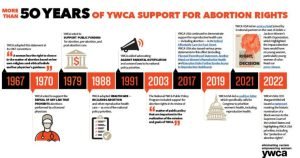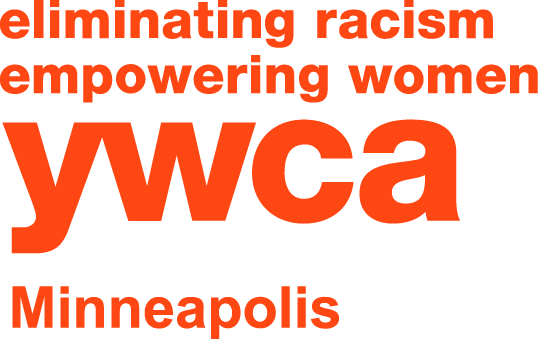Reproductive Justice – The Overturn of Roe One Year Later
One year ago on June 24, the Supreme Court decision in Dobbs v. Jackson Women’s Health Organization overturned the historic Roe v. Wade case protecting the right to an abortion under the Constitution. As one of over 200 YWCA associations dedicated to peace, justice, freedom and dignity for all, we must ensure that all peoples have the right to reproductive health care. In the wake of the overturning of Roe v. Wade, the State of Minnesota has become a model and a haven for reproductive care. 
Graphic from YWCA Metropolitan Chicago
Reproductive Justice
Reproductive justice, a framework developed and led by Black women activists, is a movement centering on these principles: the human right to personal bodily autonomy, the right to have children, the right not to have children and the right to parent and raise children in safe and sustainable communities. 
Photo credit to our Coalition partner, UnRestrict Minnesota
Legislative Wins
In the 2023 legislative session, Minnesota became the first state to codify abortion protection in law since Roe v. Wade was overturned. The PRO (Protect Reproductive Options) Act was one of the first legislation passed and signed into law this year. It establishes the fundamental right of every individual to make their own decisions about reproductive health, including abortion and contraception. Abortion has been protected in Minnesota for decades under case law, but is now protected in state statute. The Reproductive Freedom Defense Act was also passed, protecting patients traveling to Minnesota for abortion care and the providers who serve them from legal attacks and criminal penalties. The passage of the Health and Human Services Omnibus Bill brought the repeal of several restrictions to reproductive health care (in line with a 2022 Minnesota District Court ruling that many of these restrictions are unconstitutional in the state), including:
- Requirements for doctors to give state-specified information to those seeking abortion care, including misinformation about abortion and falsities of links to cancer
- A mandatory 24-hour waiting period for abortion access after the mandated counsel
- Measures that prevented abortions by any practitioner other than a doctor, excluding advanced-practice registered nurses and other qualified providers
Photo credit to our Coalition partner, UnRestrict Minnesota
Care Protection
There have also been major strides in ensuring that all centers serving pregnant people disseminate information about reproductive options that is medically accurate and not misleading. Data shows that restrictive laws such as the above disproportionately harm BIPOC people, immigrants and low-income people and that most Minnesotans polled do not want the government to ban choices about health care. The lift of these restrictions means more accessible access to health care for Minnesotans and those traveling to our state for care. Watch this video from Coalition partner UnRestrict Minnesota detailing the history of the coalition, its successes and the work yet to come.
Work Still to Be Done
Though we are grateful for the strides we have made in Minnesota to protect reproductive health and justice, there more work to be done. In 14 states, abortion is banned in a post-Roe reality, in some cases including in the early weeks before most individuals know that they are pregnant. Many states had “trigger laws” in place that were set up to immediately ban the procedure in the case of any Supreme Court ruling overturning Roe v. Wade.
Personal Action Steps You Can Take
- Do personal learning to destigmatize abortion – even pro-choice advocates may assume that abortion is difficult, sad, or negative rather than necessary health care that saves lives
- Contact your representatives at all levels to advocate for protected reproductive healthcare
- Support the National Network of Abortion Funds (NNAF)
- Say thank you to MN State Legislators working to protect reproductive freedom
- Learn about abortion doulas and the work of the SPIRAL Collective
- Volunteer as a clinic escort
Sources
- Sister Song
- Explaining SCOTUS Abortion Decision — League of Women Voters
- Minnesota governor signs broad abortion rights bill into law — AP News
- Tracking the States Where Abortion Is Now Banned — New York Times
- Minnesota Legislature Repeals Series Of Anti-Abortion Restrictions As Health Omnibus Bill Passes Both Chambers — UnRestrict Minnesota
- Reproductive Rights at the Capitol — Minnesota Women's Press
More About YWCA Racial Justice Programs Donate to YWCA Minneapolis

